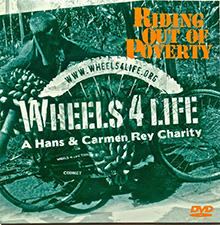In March 2007, one of our partner organisation BEN (Bicycle Empowerment Network) rewarded 5 healthcare workers at the Kibaha hospital in Tanzania with bicycles. These bikes where funded by Wheels 4 Life.
Shadya Mvumba Shadya is young un-employed woman living in Wazo Hill area. She is a primary school leaver who did not get the opportunity to advance to secondary school and has therefore been forced to look for ways of assisting her mother, Alya Mvumba, a 46 year old un-employed lady also living in Wazo area. Shadya is among the five children of Alya Mvumba and the second born. She has two brothers, one Dula who is older than her and the other Said who is youngest and still in Primary school. She has two elder sisters both primary school leavers. Despite her limited means, Alya Mvumba has to support three relatives living with her, who have recently moved in from Mwanza. They are un-educated and unemployed but in typical African tradition, Alya has to feed and take care of them. It is part of what others have termed as the “African burden”.
 So Shadya has been taught how to make home made snacks such as pan cakes, “chapattis” and buns for breakfast on selling food items notably. On a typical day Shadya wakes up at 4.00 a.m. to prepare the snacks and by 6.00 a.m. she is on the road visiting customers and looking for buyers in her neighbourhood. To do this she uses an open basket to carry the snacks so that customers can easily see what she is carrying. Shadya is complaining that the customers are difficult to find. There are many women and children out there selling snacks. She figures she can improve her business by traveling to other locations such as Mbuyuni and Tegeta where the potential for improved is much bigger.
So Shadya has been taught how to make home made snacks such as pan cakes, “chapattis” and buns for breakfast on selling food items notably. On a typical day Shadya wakes up at 4.00 a.m. to prepare the snacks and by 6.00 a.m. she is on the road visiting customers and looking for buyers in her neighbourhood. To do this she uses an open basket to carry the snacks so that customers can easily see what she is carrying. Shadya is complaining that the customers are difficult to find. There are many women and children out there selling snacks. She figures she can improve her business by traveling to other locations such as Mbuyuni and Tegeta where the potential for improved is much bigger.
Traveling to the above areas by bus would take away 400 shillings per trip which would be a big loss to her. So she decided to walk from house to house in the nearby areas. In the picture below, Shadya is seen trying a California bike. She is confident that if granted the opportunity to own a bike, she could easily boost her revenue and profits.
Sabinus Luambano
Sabinus Luambano hails from Nambalama village in Ruvuma region. He was born in 1970 (does not remember the exact dates) and is the first born among a family of six children and has a wife and three kids living with him in Dar es Salaam. The eldest goes to Primary school at Tegeta and next year the second eldest will start primary school as well.
Like many people flocking to Dar es Salaam, he came with high hopes of finding work in the City only to find himself jobless. Until one day he found an un-developed piece of land which is in a low lying area suitable for raising vegetables. He approached the owner to rent the piece of land for growing vegetables. So from that time he has been supporting his family by growing green vegetables in a rented plot in Tegeta and retailing the vegetables on house-to house delivery basis.
 Mr. Sabinus tends the vegetable gardens with his wife and while he is out retailing vegetables, his wife continues to work on the garden with short breaks in the work routine to prepare food for the family and attending the kids. The farm work includes rounds of irrigating using jerry cans and weeding, applying manure and spraying insecticide. He does not have a pump for spraying insecticide so he uses a simple brush and dips in a container with insecticide an sprinkles on the vegetables.
Mr. Sabinus tends the vegetable gardens with his wife and while he is out retailing vegetables, his wife continues to work on the garden with short breaks in the work routine to prepare food for the family and attending the kids. The farm work includes rounds of irrigating using jerry cans and weeding, applying manure and spraying insecticide. He does not have a pump for spraying insecticide so he uses a simple brush and dips in a container with insecticide an sprinkles on the vegetables.
The kind of vegetable which he prefers to grow is called amaranth (mchicha in kiswahili) which requires one to purchase seeds and manure as well as insecticide to spray against pests attacking the amaranth before it matures. He also grows okra (bamia) and water melons. The retailing work starts at 5 a.m. when the vegetables are picked and tied in bundles for selling. With the money he gets from selling vegetables he purchases seeds and manure from poultry farmers in the Tegeta area. During the heavy rainy season, the work gets nasty as rain inevitably destroys the vegetables. The plot which Sabinus uses is low lying hence getting waterlogged and he is forced to grow rice from March to June. These are the most difficult times and he has to find casual labour in Wazo Hill or Boko areas. His wife continues to tend the rice crop and Sabinus earnings as casual labourer supports the family through to the end of the rainy season.
The opportunity to own a bicycle of his own will enable Sabonis to expand his activities. Currently he borrows bikes from friends and sometimes he is stuck if they are suing their bikes at the time he wants to borrow it. Picture below shows Sabinus trying his traditional basket (tenga) of vegetables on a California Bike.














